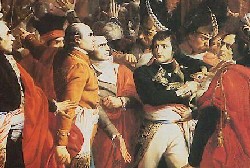|

Upon his ordered return to France, Napoleon was approached and asked to help stage a Coup d'état against the bankrupt,
unpopular Directory and the existing constitution. He used force, although no blood was shed during his take over, and then
took control of the situation rather than share the glory with those who had prompted his coup in the first place. An election
was held, although likely rigged, naming Napoleon First Consul.
Once in command, Napoleon instituted various reforms to education, taxes, law, and religion. These were known as the Concordat
of 1801 and the Napoleonic Code.
After a foiled and perhaps exaggerated assassination attempt thought to be led by the Bourbons, Napoleon found a just reason
for including a hereditary monarchy in the French constitution. He argued it would then make restoration of the Old Regime
impossible. His attempts proved successful, as he was named Emperor of France on December 2, 1804. The French people allowing
a restoration of a monarchy so soon after the Revolution was thought to be peculiar, but Napoleon’s charm and valor
apparently wiped the old connotation of a king from their minds. Many also probably feared his wrath, if they protested.
Multiple coalitions of neighboring countries formed, as they feared Napoleon’s strength and were shocked he had been
named not just a king, but an emperor.
To combat Britain, Napoleon initiated the Continental System with the intent of weakening them economically. This outlawed
British ships from French ports, leading many desparate merchants into illegal blockade running. In the end, it damaged France
almost as much or if not more than it did Britain. The Continental System proved to be Napoleon's first major political blunder.

|

